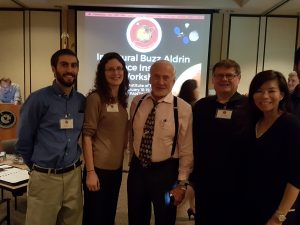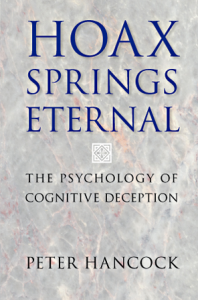NASA & Buzz Aldrin

Peter Hancock has been collaborating with NASA and researching the relationship of cognitive workload and sleep scheduling in space missions.
Pegasus Professor, Provost’s Distinguished Researcher

Peter Hancock has been collaborating with NASA and researching the relationship of cognitive workload and sleep scheduling in space missions.
The IEA Elsevier John Wilson Award is endorsed by the journal Applied Ergonomics and recognizes major contributions in the field of applied ergonomics to the actual design of work, systems, technologies and environment, which lead to improvements in system performance and well-being.

Unlike sleights of hand, which fool the senses, sleights of mind challenge cognition. This book defines and explains cognitive deception and explores six prominent potential historical instances of it: the Cross of King Arthur, Drake’s Plate of Brass, the Kensington Runestone, the Vinland Map, the Piltdown Man, and the Shroud of Turin.
Peter Hancock, a professor of psychology at the University of Central Florida discusses the connection between what one sees and the functions of the brain: “All of reality occurs inside the brain. And so, something that occurs inside the brain whether it’s due to a pathology or not, or whether it’s due to an external problem in the environment is just as real to those people as what we normally think of as real experiences.
The American Association for the Advancement of Science (AAAS) interviewed Dr. Hancock for their Member Spotlight.
The article can be found HERE
‘In this insightful and incisive text, Stedmon, Lawson and their many colleagues and co-contributors grapple with one of the most pressing issues for our species and our survival on this planet. They undertake to show how the integration of people and technology is at once the genesis of and potential solution to the vexed problems of contemporary asymmetric conflict, expressed through terrorism.
The MIT2 laboratory has had the first scientific look at using Google Glass to text while driving. The results clearly show Google GlassTM, used in this way, to be a driving distraction. There is a twist, however: Google GlassTM is superior to a smartphone in some regards.
Dr. Valerie Martindale and our Exec Committee also wishes to congratulate our AsHFA Award Winners: Dr. Torin Clark of MIT’s Dept. of Aero & Astro (Stanley Roscoe Best Dissertation Award); the Henry Taylor Award went to Col (Dr) Anthony Tvaryanas (next year’s luncheon speaker); and, for the William Collins Award the familiar name of Dr.